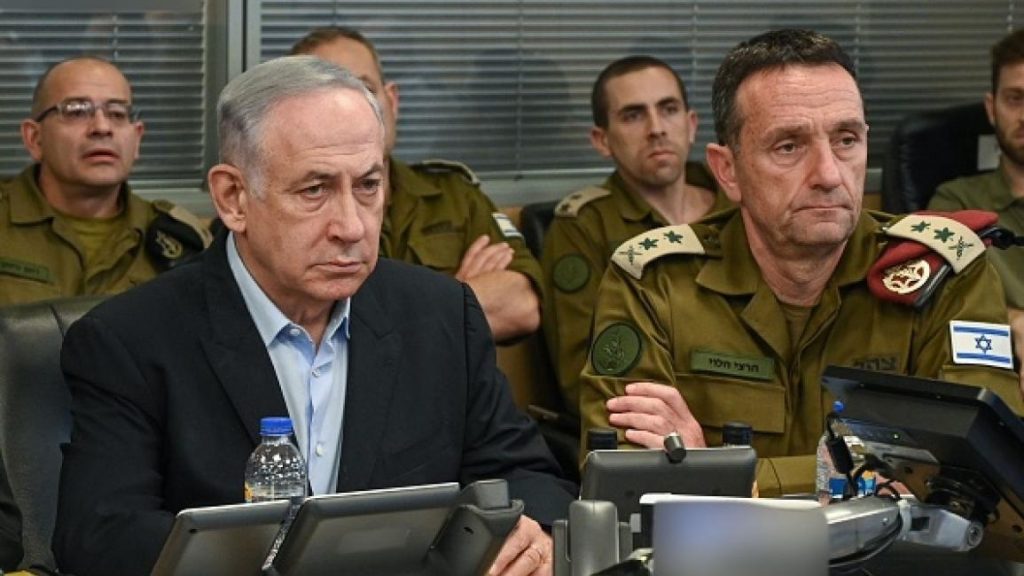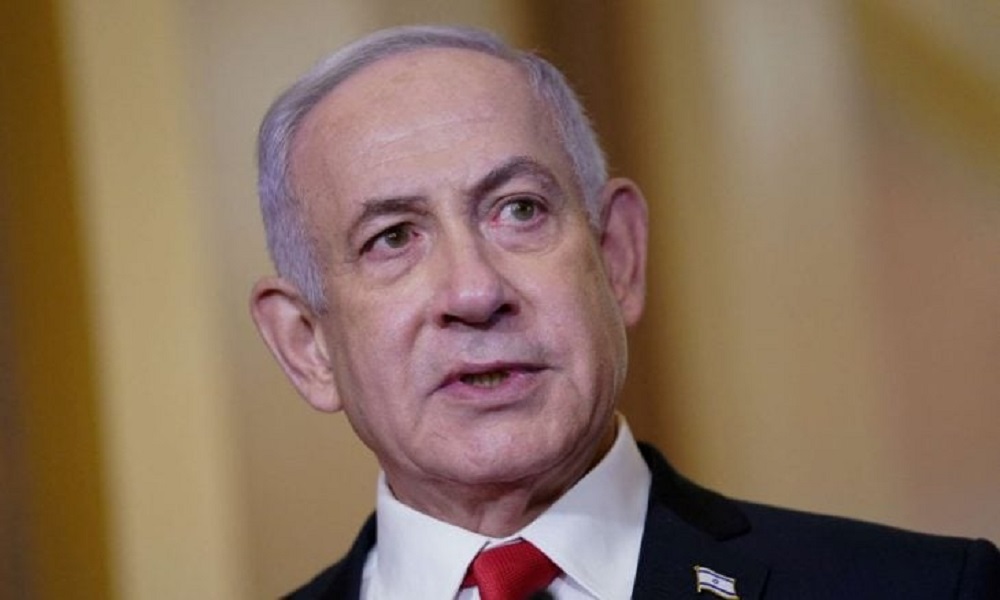Watan-Before his trip to Budapest, the Israeli Prime Minister stated that the army is taking control of additional areas in the Gaza Strip and a new axis (Morag) “in order to recover the hostages,” amid ongoing internal disputes and protests over the government’s disregard for the captives, as well as growing corruption and authoritarianism scandals.
At the same time, former heads of Mossad, Shin Bet, and military intelligence issued a joint statement asserting that his administration poses a clear and immediate danger to the country’s security and its future as a Jewish and democratic state.
Israeli media quoted security sources as saying they were surprised by Netanyahu’s announcement yesterday regarding Israel’s control over additional areas and their annexation into security zones. They clarified that the objective of the operation in Rafah is to control the “Morag” or “Philadelphia II” axis, which could endanger the soldiers.

A Risky Blow
Israeli Security Minister Yisrael Katz — widely accused within Israeli circles of incompetence and being merely a puppet in Netanyahu’s hands — declared that the goal of the military operation is to increase pressure on “Hamas” and the people of Gaza to retrieve the hostages. When an Israeli public radio reporter relayed the concerns of the hostages’ families about the danger posed by the intense bombardment, Katz repeated his earlier claim without offering a real answer: “Our soldiers are risking their lives for the hostages.”
It appears that the brutal new military operation in the southern and northern parts of the Strip aims to divide Gaza for operational military reasons and also to exert psychological and practical pressure on Hamas and the population, who are being forced to flee under heavy bombing while suffering from lack of medicine and water — all amid American support and Western and Arab silence. It’s likely that Netanyahu is trying, through this new aggression, to deflect attention from his mounting domestic scandals, the latest being the Qatari money case, which could deal a serious blow to his status and political future.
In this context, political commentator Uri Misgav wrote in Haaretz that Netanyahu knows the videos he publishes to defend himself and accuse others are no longer effective. Political columnist Merav Batito from Yedioth Ahronoth echoed this, saying Netanyahu is preoccupied with himself and his personal crises, showing no concern for the victims of the October 7 music festival massacre in the Negev. Otherwise, she said, he wouldn’t dare complain about being persecuted on the same day the investigation’s findings were presented to the victims’ families.
Meanwhile, Netanyahu continues to downplay the accusations and criticisms directed at him. During a court appearance yesterday, he tried to minimize the Qatari money case, claiming that recently dismissed Shin Bet chief Ronen Bar fabricated the matter to avoid being fired. He launched a counterattack, saying Bar himself visited Qatar, watched World Cup matches, and came back praising the country—just like Yair Lapid and Benny Gantz had done in the past.
In this regard, Israeli public radio criticized Netanyahu for ignoring the fact that his close National Security Advisor Tzachi Hanegbi had previously praised Qatar’s role in mediating the hostage deal.
Haaretz published a caricature reflecting the debate over the “Qatari infiltration” of the Israeli Prime Minister’s Office. The cartoon depicts a Qatari official seated with Netanyahu to his right, across from fired Shin Bet chief Ronen Bar, with the two suspects/advisors behind him. In the background, a sign reads: “Hostage Release,” with a sarcastic slogan beneath it: “Turns out Qatar will mediate.”
Today, Israeli police are expected to request an extension of the detention of two of Netanyahu’s advisors, who are suspected of breach of trust, money laundering, and contact with a foreign agent. Netanyahu continues to claim he was unaware they received money from sources linked to Qatar. The opposition mocks this with the saying: “If you knew, it’s a disaster; if you didn’t, it’s a bigger disaster.”
The Stalled Deal
Regarding the stalled deal that Netanyahu disrupted by refusing its terms, and in response to Hamas stating that it would not respond to an Israeli proposal while it is waging war on Gaza, the same radio station reported that the Israeli government insists on negotiating “under fire.” The station questioned whether the current violent military operation is helping to retrieve the hostages — or killing them — and dragging Israel into more massacres of innocent Palestinians and into a long, costly war of attrition.
This concern is echoed by 17 former chiefs of Mossad, Shin Bet, military intelligence, the army, and police in a joint paid statement published in Hebrew newspapers. They warn that Netanyahu’s management of the country poses a clear and immediate danger to its security and future as a Jewish and democratic state.
Jeopardizing Israel’s Security and Future
The statement includes sharp accusations and a call for general elections: “Netanyahu pursued a policy of empowering Hamas and avoiding harm to its leaders. The October 7 attack falls under his responsibility. To this day, he refuses to replace Hamas. Renewing the war in Gaza now is driven by non-objective reasons and lacks any achievable political goal. It will not lead to the release of hostages or the defeat of Hamas, and it erases the army’s and security establishment’s achievements in the war. Ending the war would enable normalization with Saudi Arabia and better preparedness for the Iranian threat. Netanyahu operates under a conflict of interest and is leading Israel toward disaster. He is undermining state security and the democratic system, turning it into an autocracy. By pushing the law to exempt the ultra-Orthodox from military service, he is shattering the people’s army model and harming its operational capability. His immediate protection of his advisors in the Qatari money case, along with the decision to dismiss the Shin Bet chief and legal advisor leading the investigation, raises serious suspicions about his role in the case. His announcement of a successor to Bar and the reversal of that decision within hours shows that loyalty is replacing professionalism in his decision-making.”
The former security chiefs conclude by saying: “Therefore, we, former heads of the security establishment over the past decades, call for recognition that Netanyahu’s behavior raises serious doubts about his fitness to serve as Prime Minister. We also call for intensifying the popular protest, immediate return of the hostages through a ceasefire deal, formation of an official investigation committee, halting divisive and controversial legislation, respecting Supreme Court rulings, and setting an agreed-upon date for general elections so that the people can speak.”
The statement is signed by Shlomo Aharonishki, Ami Ayalon, Nadav Argaman, Ehud Barak, Carmi Gillon, Efraim Halevy, Dan Halutz, Moshe Ya’alon, Danny Yatom, Dudi Cohen, Amos Malka, Ravid Pald, Yaakov Peri, Tamir Pardo, Aharon Ze’evi-Farkash, and Uri Sagi.
In a related development, Tamir Hayman, head of the Institute for National Security Studies, was asked by Army Radio: “If we want to eliminate Hamas’ rule in Gaza, why do we reject the idea of replacing it?” He cautiously criticized Netanyahu’s vision, saying: “The Arab proposal for civilian rule still leaves Hamas present in the Strip, and there’s no mechanism to monitor disarmament.”
He added: “That’s why opponents of the plan see it as a Hezbollah-style model in Gaza: a civilian political system with Hamas still controlling the lower levels — just as it makes no sense for Israel to agree never to return to war in Gaza, as that would limit its ability to defend itself. I say, in response, that the plan still leaves Israel with security control over the Strip.”
Netanyahu and His Wife in Budapest
But Netanyahu seems unfazed by all these heated internal and external fronts. He and his wife Sara flew to Budapest, where he will meet Hungarian Prime Minister Viktor Orbán — himself known for his authoritarian and populist right-wing tendencies — and who previously declared he would not comply with the International Criminal Court’s arrest warrant for Netanyahu. The visit will last four days, during which Netanyahu and his wife will take a cruise on the Danube, aligning with his attempts to downplay the explosive Qatari money case and craft a public image that things are normal — that he’s engaged in diplomacy — and perhaps to catch a breath amid the barrage of disputes, scandals, and authoritarianism allegations.
